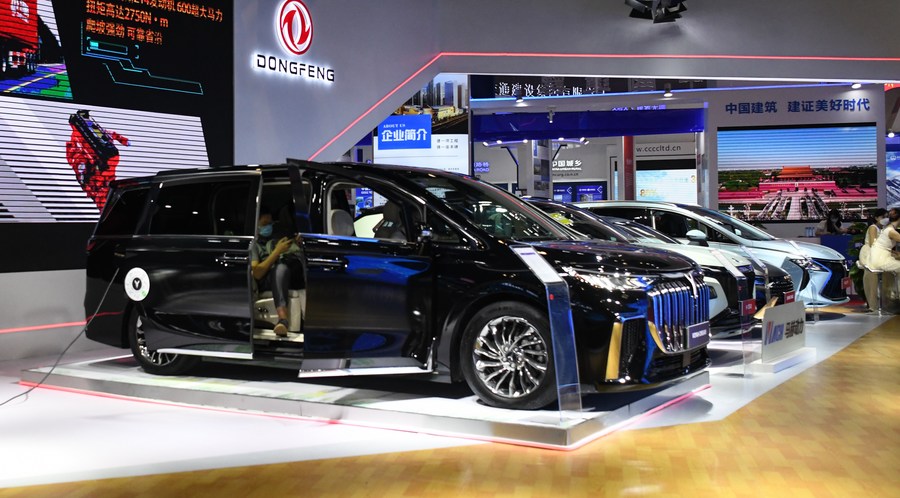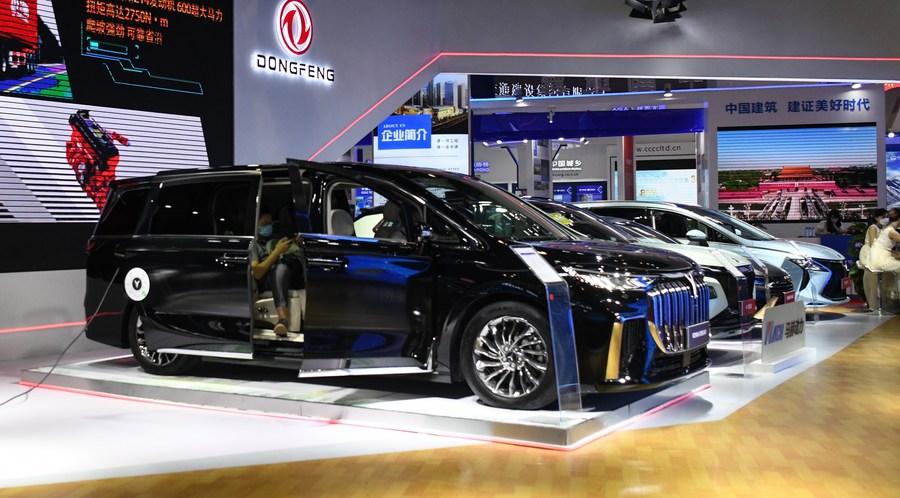
A visitor tries a new energy car during the 19th China-ASEAN Expo in Nanning, capital of south China's Guangxi Zhuang Autonomous Region, Sept. 17, 2022. (Xinhua/Zhang Ailin)
BEIJING, Aug. 24 (Xinhua) -- Evolving from exporting products to setting up factories and making investment overseas, Chinese auto companies have been making steady progress in expanding their overseas business.
Taking the upward trend of new energy vehicles (NEVs) as an important opportunity, auto firms in China are striving to develop global competitiveness in the auto industry through promoting comprehensive growth of overseas market.
-- Chinese NEVs shine in Southeast Asian market
Data from the China Association of Automobile Manufacturers shows that China's vehicle exports soared 35.1 percent from a year earlier to 392,000 units in July, when 101,000 NEVs were exported, marking a year-on-year increase of 87 percent.
From January to July, total vehicle exports reached an impressive 2.53 million units, up 67.9 percent year on year. NEV exports saw an increase of 1.5 times than the same period last year, reaching 636,000 units.
"China's NEVs are mainly exported to the markets in Western Europe and Southeast Asia. This year, we observe robust growth in exports to Southeast Asian countries like Thailand," said Cui Dongshu, secretary general of the China Passenger Car Association (CPCA).
With domestic brands showcasing advanced NEV technologies, the NEV models of SAIC Motor, BYD and other brands have demonstrated strong performance in the Southeast Asian market, according to Cui.
For instance, in the first five months of this year, Chinese automakers exported a total of 69,129 vehicles to Thailand, of which 66,321 were new energy passenger vehicles, according to statistics from the CPCA.
Among electric vehicles, the BYD Atto 3 came in as the bestseller for five consecutive months in Thailand, with 11,167 units sold in the first half of this year, taking up 35 percent of the market share.
On July 3, 2023, the Wuling Air electric vehicle made its debut in the Thai market, attracting substantial attention in the mini-car segment. In 2022, the Great Wall Motors (GWM) sold nearly 12,000 vehicles in Thailand, expecting to reach a total sales of 20,000 units this year.
The rapidly growing Chinese NEV industry not only serves as a growth engine for domestic automakers' international expansion, but plays a pivotal role in fostering multi-level cooperation and green development among the Belt and Road countries and regions.
-- Pattern of exports shows variation
As auto companies including SAIC Motor, BYD, GWM, Geely, Chery and others are hastening their efforts in promoting manufacturing overseas and core supply chain integration, the synergy between China's NEV sector and the global arena is showing noticeable patterns of localization, market-oriented, as well as featuring green and low-carbon practices.
In March this year, Neta Auto announced the groundbreaking of an ecological smart factory in Thailand, aiming to develop the factory into a major manufacturing hub for right-hand-drive electric vehicles and for exports to members of the Association of Southeast Asian Nations (ASEAN).
In April, it was announced that SAIC-GM-Wuling had signed a memorandum of understanding for new NEV projects with Indonesia's Coordinating Ministry for Maritime and Investment Affairs to actively expand its investment in the country, introducing more NEV models to the Indonesian market.
Already made investment to establish factories in several Belt and Road countries, Chery is strategically advancing the layout of its core industrial chain within the ASEAN region. This involves the plans for a battery manufacturing base and the enhancement of the supply chain of parts and components including batteries, battery recycling and new materials.
In recent years, ASEAN countries, such as Malaysia and Thailand, have accelerated the transition to electric vehicles, yielding fruitful outcomes in China-ASEAN collaboration on NEVs, according to Wang Weiming, an official with the Ministry of Industry and Information Technology.
Chinese NEV enterprises have progressively adopted localization strategies that involve establishing local factories, procuring components and sell products locally, laying a solid foundation for continuously deepened collaboration between China and ASEAN members, said Wang at a recently held forum themed on China-ASEAN NEV cooperation.
The relationship between China and ASEAN has transcended traditional trade ties and now requires greater focus on the holistic regional layout of industrial and supply chains, said Zheng Yongnian, a professor with the Chinese University of Hong Kong (Shenzhen).
For the auto industry to actually integrate into the overseas markets, it is necessary to build sales channels, promote product localization, improve service networks and understand the needs of local consumers, said Wang Huaibing, CFO of Malaysian carmaker Proton, noting that cultural exchanges also play a crucial role in promoting the development of Chinese enterprises overseas.
In addition, leveraging their experience in promoting NEVs domestically, Chinese auto firms going overseas are also actively engaged in local policy-making discussions related with new energy.
In the pursuit of global market expansion, an overarching principle becomes evident -- a comprehensive and culturally attuned approach that encompasses local needs, fosters partnerships, and aligns with global policy agendas. (Contributed by Li Tangning, edited by Yu Huichen with Xinhua Silk Road, yuhuichen@xinhua.org)




 A single purchase
A single purchase









